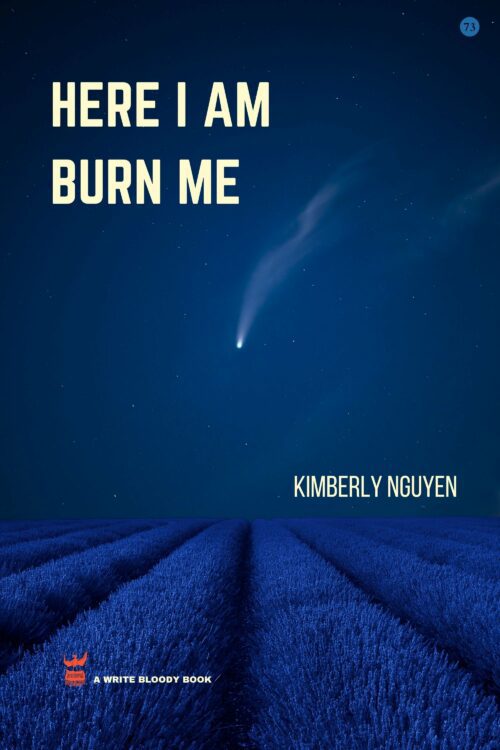
In her most recent collection of poems, Here I am Burn Me, Kimberly Nguyen’s words are a punch in the gut, an inspiration, and an evocation of nostalgia, grief, pain, and hope—all at once. Her poems navigate the complexities of life through many lenses: history of the war torn homeland, the journey to reclaiming and preserving the mother language, growing up as chi hai, the “eldest daughter of an eldest daughter of an eldest daughter,” and complicated family relationships. The collection does not leave any topic untouched, and the reader will turn the pages with their heart in their throat. Reading much like a poetic diary, the collection weaves us through the personal journey of a young woman seeking to understand her complex intersectional identity as a Vietnamese woman, daughter of refugees, partner, and poet.
Nguyen begins her book with the poem “Let Me Begin By Washing My Hands.” The lines, “Reader don’t blame me: I was born in the starless night/In the darkness/I saw a shadow and shined a light on it” invite the reader into Kimberly’s world, providing a peek into her own creation story as a human being and a writer. She continues poignantly, “I wrote a path out of the darkness,” implying that her words as a poet are her medicine, her own saving grace. From the beginning of her book, it is clear Nguyen is writing her way out of her darkness, shining a light into her future. One of my favorite lines comes at the end of the poem, “I’m sorry to everyone my path cut through, but I named every place I ran into.” The work of the poet and writer reflects their life experiences, which inevitably collide and intersect with those of others. As poets, we are caretakers, sharers, and recorders of this history. It is our duty to write the truth and course of events as we see them, though others will not always agree with us.
In “A Vietnamese Coming-Home Greeting,” Kimberly ponders the meaning of “home”: “What is a home but a place a mother calls you? / But I have pressed my ear against the cold glass telephone and nothing.” The idea of home as a place of simplicity and comfort becomes more troubled over time. And our perception of what home has meant to us in the past, present and future also evolves. Sometimes home takes on new meanings and shapes, some of which may be painful. Not only does our perception of home change, but home becomes less of a focal point of our lives over time. Kimberly writes, “I am a daughter which means I was born writing poems out of absence.”
Throughout her collection, Kimberly gives voice to the feeling of grasping for her mother language. She is trying to mend the gaps between the language of the motherland and the new homeland. This feeling of loss through translation, not only of language, but also of certain emotions and experiences are important facets in Nguyen’s poetry. In “My Father Says He Wouldn’t Riot if the Police Killed Me,” Kimberly states, “Grief—a word I’m not sure exists in my mother tongue.” When my mother translates phrases from Vietnamese to English, she often tells me that there isn’t a word in English to convey the full meaning or emotion of a Vietnamese word. The loss of this meaning feels dire, like there is a part of my family’s story that I am missing and cannot recover. Much like the Vietnamese homeland which was prematurely torn away from mine and Kimberly’s families during the war, it feels like we are being robbed of the texture of our family history and culture even in its aftermath.

Nguyen also understands that the fraught relationships within her family are a deeper issue than language barriers. In “My Father Says He Thought I Went to College for Him,” Kimberly portrays the inner turmoil and guilt for both parent, who has made a great sacrifice, and child who receives this sacrifice. She writes, “I need you to realize that this life I have is because you gave it to me and you can’t take it back.” In “Con Hơn Cha Nhà Có Phước, Kimberly shifts toward perceiving this sacrifice as bittersweet for both of them, “Father the saying goes that if your child climbs higher than you the whole family is fortunate… / You gave your whole life so I could surpass you gave me all you could not have and now you see me in the stars…” When my mom and her family escaped from Vietnam by boat, my grandparents took minimum wage jobs to make ends meet. My mom recalls crying in the bathroom as she saw her father cleaning movie theaters each weekend. As Kimberly aptly conveys in this piece, my mother too felt a sense of guilt and sadness regarding the sacrifices which her parents made to provide her and her siblings with a better life than they had back in Vietnam. My own mother did the same, cleaning houses to pay for her education at UC Berkeley. Most all my successes are built upon the sacrifices of my grandparents and mother, who had to forego some of their own dreams to ensure I could achieve my own.
“On Being Chi Hai” is my favorite piece in the collection. I am also “the eldest daughter of an eldest daughter of an eldest daughter,” and this poem resonated with me. Kimberly conveys the burden of being the eldest daughter who takes on the role of a “surrogate mother,” holding together the tapestry of the family. She explores how this role is both a blessing and a curse. As an eldest daughter, I’ve witnessed firsthand the ways in we are often subconsciously parentified within our own families. I’ve also experienced the biggest joys in life being able to be an older sister and have found a sense of purpose in taking on this role. In “I Love You the Way Only a Chi Hai Could” Kimberly explores her role as the dutiful chi hai through the lens of herself as a partner. The piece portrays how chi hai’s can easily mold themselves to what their partners, lovers and, society desire, since they are expected to do this from birth, “I love you the way only a chi hai could without bounds, without boundaries / Selflessly / And I mean I’ll love you like I have no self to love / In my family I am all the good adjectives… / every girl in my family wants to be good, obedient, and meek.” I found these lines to be especially poignant, as she so aptly conveys the trials and tribulations of growing into one’s womanhood as an eldest daughter, and what this means within not only the context of family, but also the wider fabric of society.
Kimberly Nguyen’s Here I am Burn Me is a powerful collection that will leave you speechless, and which you will devour in one sitting. It is the perfect coming of age collection that spoke to my own journey through life as a Vietnamese woman. Her clear mastery of poetic language, paired with her brutal honesty and vulnerability are a gift to witness. She does not shy away from tackling some of the most complex facets of the diasporic experience. It takes courage to tackle these issues of war and intergenerational trauma, and Nguyen does not mince words in making the reader feel this pain and complexity, which is what makes her writing so important. Her voice, controlled yet raw, offers an insightful window into her most personal life experiences and thoughts, and inspires us to reflect on where we come from.
Here I Am, Burn Me
by Kimberly Nguyễn
A Write Bloody Book, $20.00
Liked what you just read? Consider donating today to support Southeast Asian diasporic arts!

Carina Kimlan Hinton is a mixed race, Vietnamese American poet and writer who explores issues of identity, cultural belonging and intergenerational trauma in her writing. Her mother’s family are Vietnamese refugees, and she grew up hearing stories of their escape during the Vietnam War. She seeks to understand this journey and legacy in her writing. In 2020, she graduated from UC Berkeley with a major in History, and concentration in Post-Vietnam War Vietnamese Amerasian History. As part of her program, she completed a senior thesis exploring the experiences of Vietnamese Amerasian children born in Vietnam during the war. You can find her work in the following publications: DiaCRITICS (Diasporic Vietnamese Artists Network),Real Soul (and here), Project Yellow Dress (here and here), Vietnamese Boat People (and here) Watercress Literary Journal (here and here) and the UC Berkeley Literature and Arts Magazine. She was a finalist for the Japanese American Citizens League (JACL) Digital Storytelling Contest.


